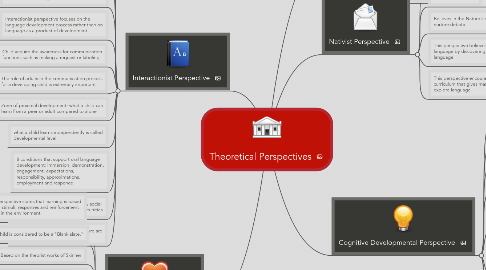
1. Interactionist Perspective
1.1. Focus on Nurture
1.2. Focus on pragmatic language knowledge
1.3. based on the works of theorists Vygotsky, Bruner and Halliday.
1.4. This perspective focuses on the role of sociocultural interaction in children's development of language
1.5. Language is acquired by children out of need to function in society
1.6. Interactionist perspective focuses on the language development process rather than on language as a product of development
1.7. Child acquire the awareness for communication functions such as making a request or labeling
1.8. The role of adults in the communication process for a developing child is extremely important
1.9. Zone of proximal development- what a child can learn from a peer or adult compared to alone
1.10. what a child learns independently is called developmental level
1.11. 8 conditions that support oral language development: immersion, demonstration, engagement, expectations, responsibility, approximations, employment and responce
1.12. Encourages teachers to provide many social interactions and many 'talking' opportunities
1.13. Acknowledges that nature and nurture are inseparably interwinded
2. Behaviorist Perspective
2.1. This perspective states that learning is based on the stimuli, responses and reinforcement that is in the environment.
2.2. A child is considered to be a "Blank slate."
2.3. Based on the theorist works of Skinner
2.4. Focus on the Nurture side of the debate
2.5. Focus on semantic, syntactic and morphemic language knowledge.
2.6. Reinforcement of a child's verbal and non verbal responses to language is responsible for language learning.
2.6.1. Reinforcement is usually in the form of attention, repetition and approval.
2.6.1.1. Positive reinforcement
2.6.1.1.1. Positive reinforcement is a type of conditioning or called operant conditiions
2.7. Operant conditioning explains imitations- child's attempts to imitate and adult
2.7.1. Imitation would be saying "bye-bye" or "ma-ma" then receiving positive reinforcement for this language
3. Plan
3.1. Goals
3.1.1. Goal 1
3.1.2. Goal 2
3.2. Rules
3.2.1. Session Rule 1
3.2.2. Session Rule 2
3.3. Define Problems
3.4. Capture Ideas
3.5. Prioritize Ideas
3.6. Define Action Points
4. Nativist Perspective
4.1. Emphasizes in born human capabilities
4.2. Theorist is Chomsky
4.2.1. Focus on Syntactic language Knowledge
4.3. Believes in the Nature side of the nature vs. nurture debate.
4.4. This perspective believes that children will learn language by discovering the structure of the language
4.4.1. This is based on the thought that humans are all born with a mechanism that is specific for learning a language .
4.4.1.1. This mechanism is called Language Acquisition Device (LAD)
4.5. This perspective encourages teachers to use a curriculum that gives many opportunities to explore language
4.5.1. Give many opportunities for both oral and written language.
4.5.1.1. More opportunities will active the LAD
5. Cognitive Developmental Perspective
5.1. The Cognitive Developmental perspective states that language is acquired as a child matures.
5.1.1. Sub Idea 2
5.2. Is based on the works of theorists Jean Piagnot
5.3. Focus on Nature
5.4. Focus on Semantic and morphemic language knowledge.
5.5. This perspective states that a child learns language by using the same mechanism as other learning- that there is no special mechanism just for language.
5.6. first stage is the sensorimotor stage, when children are prelingusistic
5.6.1. Pre-lingusistic is children learning their environment through sensory and motor activities
5.6.2. 2nd stage is preoperational stage. Starts around age 2 through7. Begins to represent the world through words images and drawing
5.7. This perspective encourages teachers to pay very close attention to each child's stage of cognitive development and plan age/development appropriate activities
5.8. Important part of the onset of language is the development of object permanence.
5.8.1. Object permanence is a child knowing that an object still exist even though they can not currently see it.
